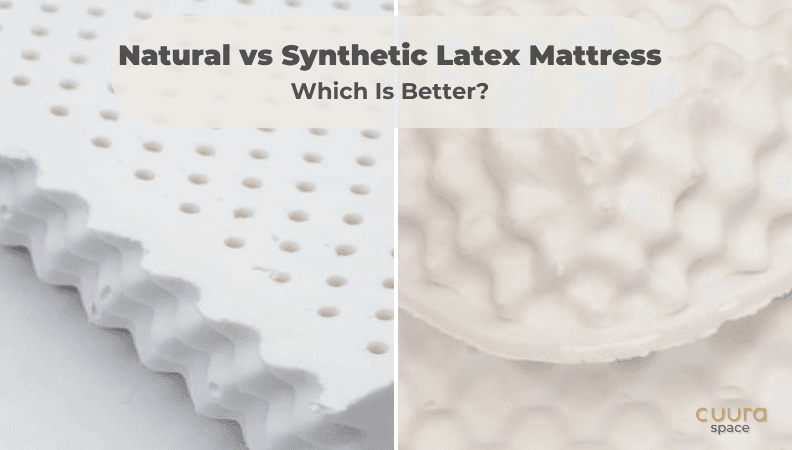When it comes to choosing a mattress, we often focus on factors like comfort, support, and durability. However, another crucial aspect that deserves attention is the type of latex used in the mattress. Latex mattresses have gained popularity for their exceptional qualities, but there are two primary types to consider: natural and synthetic latex.
In this article, we'll delve into the key differences between these two materials, their origins, and how they impact your sleep. So, let's explore the world of natural and synthetic latex mattresses to help you make an informed decision.
Where Do Natural and Synthetic Latex Come From?
Natural Latex: Getting Comfort from Nature's Trees
Natural latex is like a special gift from rubber trees (called Hevea brasiliensis scientifically). Think of it like getting syrup from maple trees.
Workers cut a small slanting line in the rubber tree's bark, and the white liquid latex drips out into containers. Don't worry; this doesn't hurt the tree at all. It's a nature-friendly way to get comfortable latex without harming our environment.
Synthetic Latex: Creating Comfort in a Lab
Synthetic latex, on the other hand, is made by people, not trees. It's created in a lab using chemicals like styrene and butadiene, which come from things like oil. It's made to feel just like natural latex, but it doesn't come from Mother Nature's trees.
What Makes Natural and Synthetic Latex Different?
Natural latex and synthetic latex may feel similar, but they're different in where they come from and what they do for our planet.
-
Natural Latex is all-natural, coming from rubber trees. It's a 'green' choice because these trees are good for the planet. Plus, natural latex shapes to your body for extra comfort, and with the right care, it can last up to 20 years!
SOMMNI mattresses are made from 100% natural latex in addition to other quality materials, and has a lifespan of up to 30 years.
-
Synthetic Latex is made from oil-based chemicals. It's not as eco-friendly as natural latex and has a more significant impact on Mother Earth. But it's a good option if you're allergic to natural latex because it doesn't have the same proteins. Both types give great support, but natural latex has that special touch, making it feel a bit more responsive to your body's shape.
In Malaysia, where comfort and environment are essential, understanding these differences can help you choose the right mattress that suits your needs and values.
| Features | Natural Latex Mattress | Synthetic Latex Mattress |
| Composition | Extract from Hevea-Brasilienis (rubber) tree | Petrochemicals (SBR-styrene butadiene) |
| Feeling | Springy and supportive | Less springy, dull |
| Durability | Can easily last over 20 years with proper care. | Poor, will tear after a short period of use. |
| Smell | Natural latex smell, similar to wood | Toxic off-gassing |
| Look | Natural imperfections | Unnaturally smooth |
| Colour | Creamy/ivory, may turn yellowish when exposed to UV sunlight | Whitish or any colour, depends on chemical additive |
| Breathability | Sleeps cools because of open-cell matrix of natural latex which allows good air flow | Sleeps more hot because SBR doesn’t have an open-cell structure so air doesn’t flow |
| Biodegradable | Yes | No |
| Volatile Organic Compounds (VOC) | No | Multiple health concerns because of presence of VOC |
| Price | More expensive | More affordable |
| Weight | Heavy | Lighter |
| Other features | Anti-dust mite, antifungal and antibacterial by nature | Depends on chemicals added |
FAQs
1. Is synthetic latex mattress good?
Yes, synthetic latex mattresses can be a great choice. They offer good support and are often more affordable than natural latex options. Just make sure to check for quality materials and choose one that suits your comfort preferences for a good night's sleep!
2. Can synthetic latex mattresses be considered eco-friendly
Synthetic latex mattresses are not as eco-friendly as natural latex mattresses due to their reliance on petroleum-based materials.
3. Are latex mattresses suitable for all sleeping positions?
Yes, latex mattresses are versatile and suitable for all sleeping positions. They offer the right balance of support and comfort, accommodating back, side, and stomach sleepers.
4. Do latex mattresses have a distinct odour?
New latex mattresses may emit a slight rubbery odour initially, especially in synthetic latex. However, this odour dissipates over time and is considered non-toxic.
5. Can I use a latex mattress with a latex allergy?
If you have a latex allergy, it's best to consult with a healthcare professional before considering a latex mattress. Those with severe allergies may need to avoid latex altogether.
Summary: Is A Natural or Synthetic Latex Mattress Better?
The decision between natural and synthetic latex mattresses involves considering personal preferences, budget, and environmental concerns. Natural latex is eco-friendly, comfortable, and long-lasting, derived from sustainable sources. On the other hand, synthetic latex offers a latex-like feel without natural material concerns.
SOMMNI King Mattress - Up to 150 Nights Sleep Trial
The SOMMNI mattress brings together the goodness of 100% certified natural latex and soft memory foam. The natural latex gives all-around flexibility, providing great support and relieving pressure. While the memory foam absorbs energy and offers unmatched comfort by perfectly moulding to your body's shape. This special blend guarantees a supportive, pressure-relieving, and incredibly comfortable sleep for you.

